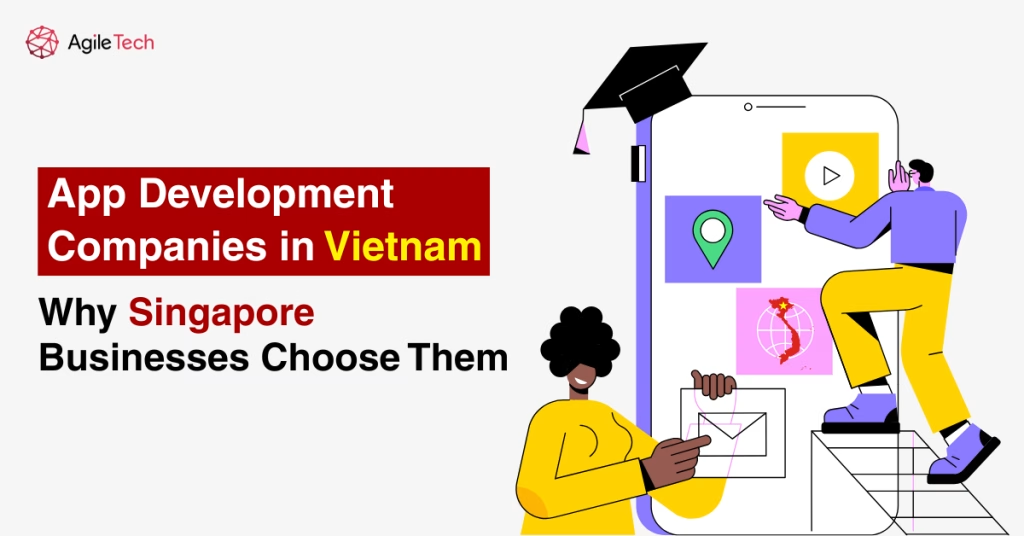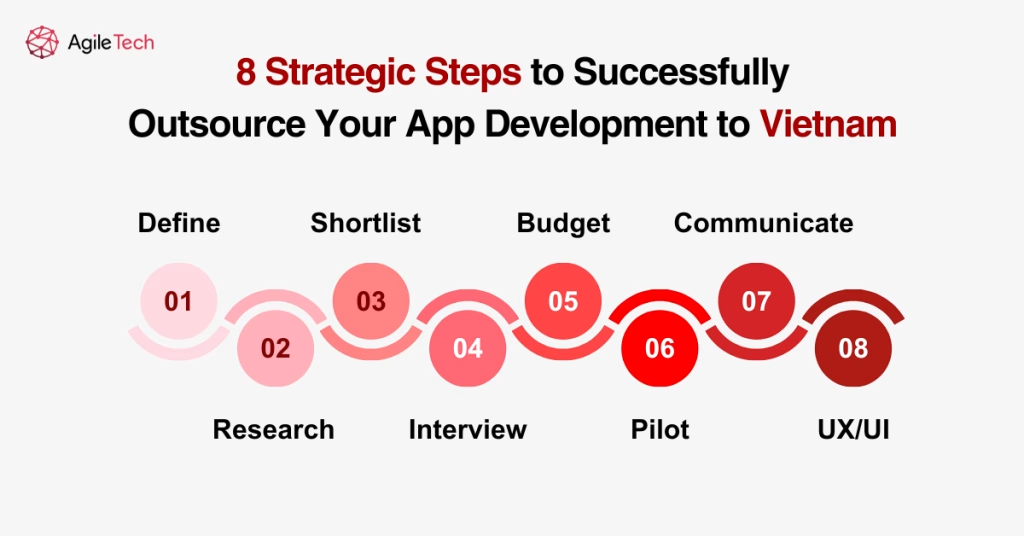App Development Companies in Vietnam: Why Singapore Businesses Choose Them
In today’s digital economy, mobile apps are at the core of how businesses connect with customers. Whether it’s for e-commerce, communication, or service delivery, having a well-built app is essential. However, building a robust app is often costly and time-consuming, especially for startups in high-cost regions like Singapore.
This is why more and more Singaporean enterprises and startups are turning to Vietnam app development companies. In this article, we explore why this trend is growing, how Vietnamese development firms deliver success, and how businesses can choose the right outsourcing partner.

1. Rising Costs of Local App Development in Singapore
Developing a mobile app in Singapore can cost anywhere from $10,000 to $150,000, depending on the complexity and features. These high costs stem from higher salaries, overheads, and the overall economic landscape. For startups, these numbers can be overwhelming and often act as a barrier to launching their digital product.
A Cost-Effective Alternative
Vietnam has emerged as a viable alternative where companies can reduce development costs by up to 50% without compromising on quality. Lower labor costs, reasonable operating expenses, and a competitive IT sector enable Vietnamese companies to deliver projects at a fraction of the cost seen in Singapore.
Read more: Top Emerging Asian Countries For Outsourcing in 2025
2. The Advantages of Vietnam App Development Companies
Lower Costs, Same Quality
Contrary to the outdated belief of “cheap means low quality,” Vietnam’s app development companies consistently produce world-class software. Salaries and operational expenses are lower in Vietnam, allowing companies to pass those savings to clients while maintaining international standards in project delivery.
A Deep Talent Pool
Vietnam boasts a young, tech-savvy population with a strong emphasis on STEM education. The government has invested in education reforms to ensure that software engineering and computer science are widely accessible. The country has over 1 million developers, ensuring a steady and rich pool of talent for software development projects.
English Proficiency
Vietnamese developers generally have a good command of English. According to the EF English Proficiency Index, Vietnam ranks higher than many of its regional neighbors. Developers working in outsourcing firms are particularly well-versed in technical English, making communication seamless throughout the development process.
Cultural and Time Zone Compatibility
Being part of Southeast Asia, Vietnam shares cultural traits and business etiquette with Singapore. This familiarity makes collaboration smoother. With just a one-hour time difference, real-time collaboration is also easier compared to working with partners in distant time zones.
Comparison with Other Markets
| Country | Cost Level | English Proficiency | Time Zone Proximity | Talent Availability | IP Protection |
|---|---|---|---|---|---|
| Vietnam | Low | High | +1h from Singapore | Strong & Growing | Good (Improving) |
| India | Low | Medium | -2.5h from Singapore | Very High | Moderate |
| Philippines | Medium | Very High | Same as Singapore | Moderate | Good |
| China | High | Medium | +0h | Very High | Moderate |
| Eastern Europe | Medium–High | Medium | -5 to -8h | Strong | Strong |
3. How to Successfully Outsource App Development to Vietnam
Outsourcing software development can be incredibly successful when done right. Below is a detailed guide to help you through the process:

Step 1: Define Your Goals
Start by identifying your app’s core purpose. What specific problems will it solve for users? What are the primary features it must include? Is it for Android, iOS, or cross-platform? Establishing clear goals and KPIs early ensures the project stays aligned with business outcomes.
Step 2: Research App Development Companies
Leverage online platforms like Clutch, GoodFirms, DesignRush, and LinkedIn to identify companies that specialize in your niche. Focus on their technology stack, client portfolio, and case studies. Prioritize firms with experience building apps in your target industry or user base.
Step 3: Shortlist and Compare
Narrow down your search to 3–5 companies. Evaluate their pricing models (hourly, fixed, dedicated team), technical capabilities, and past performance. Investigate how they manage post-launch support, scalability, and updates.
Step 4: Interview and Evaluate
Set up interviews with project managers, developers, and designers. Ask about their development lifecycle, quality assurance procedures, and risk mitigation strategies. Gauge how well they understand your business and whether they can offer proactive solutions.
Step 5: Discuss Timeline and Budget
Request a structured proposal with estimated costs, development milestones, deliverables, and deadlines. Ensure transparency in billing and evaluate their approach to delays, feedback cycles, and change management. Clarify intellectual property rights early.
Step 6: Start with a Pilot Project
Launch a small-scale MVP or a feature-limited version of your app to test compatibility and capability. This reduces risk and gives you insights into their delivery consistency, code quality, and communication habits before scaling up.
Step 7: Establish Clear Communication Protocols
Adopt tools like Jira for task tracking, Slack for quick messaging, and Zoom or Google Meet for regular calls. Create weekly syncs and retrospectives. Use shared cloud storage for documentation, assets, and approvals.
Step 8: Emphasize UX/UI and Compliance
UI/UX is crucial for user adoption. Work closely with their design team to develop personas, wireframes, and clickable prototypes. Validate interfaces via testing with real users. Also, confirm they follow best practices for compliance (GDPR, HIPAA) if applicable.
4. Best App Development Companies in Vietnam
AgileTech
AgileTech is known for its agility, versatility, and strong innovation mindset. The company has delivered scalable products across industries like fintech, logistics, healthcare, and social networking. Their team excels in native and cross-platform development, with a strong QA department that ensures reliable deployments. AgileTech also offers AI, blockchain, and Big Data services for advanced digital projects.
Saigon Technology
With ISO/IEC 27001 and ISO 9001 certifications, Saigon Technology has built a reputation for secure, reliable outsourcing. Their clients include Fortune 500 enterprises and tech startups globally. The company is proficient in .NET, Angular, Node.js, and Flutter, offering full-cycle services from concept to maintenance. Saigon Technology also specializes in Agile project delivery and DevOps automation.
CO-WELL Asia
CO-WELL Asia has extensive experience serving clients in Japan and across Asia-Pacific. Their strengths lie in e-commerce, enterprise system development, and manual/automated testing. They provide bilingual staff, dedicated QA teams, and support across AWS and Azure platforms. CO-WELL is a good fit for businesses looking for long-term partnerships and enterprise-grade solutions.
Savvycom
Savvycom blends technical expertise with business consulting. Their multidisciplinary team has delivered over 300 digital projects, particularly in healthcare, fintech, and education. They focus on innovation strategy, lean development, and mobile-first design. With offices in Hanoi and Ho Chi Minh City, they’re well-positioned to serve both local and international markets.
STS Software
STS Software stands out for its emphasis on security and documentation. It’s a reliable choice for SMEs seeking budget-friendly solutions without compromising process quality. Their portfolio includes apps for real estate, hospitality, and logistics. STS offers fast prototyping, multilingual support, and in-depth technical consultations.
5. Tips for Maximizing Success When Outsourcing
Choose the Right Engagement Model
Select an engagement model based on your project scope. Fixed-price contracts are ideal for clearly defined projects with minimal changes. Time-and-materials is best for evolving scopes, while the dedicated team model suits long-term or large-scale app development.
Document Everything
Maintain comprehensive documentation throughout the project lifecycle. Use collaborative tools like Notion, Confluence, or Google Docs to store requirement specs, wireframes, revision logs, sprint plans, and testing feedback. Clear documentation minimizes miscommunication and scope creep.
Focus on UX/UI Design
Invest early in design thinking. Start with empathy maps and user flows, then translate them into wireframes and clickable prototypes. Prioritize accessibility, responsiveness, and consistency across devices. Validate designs with usability testing and refine based on real-world feedback.
Prioritize Security and Compliance
Ensure data protection with secure login methods, encrypted storage, and robust API security. Conduct regular vulnerability scans and penetration testing. Work with teams familiar with global data protection laws like GDPR, HIPAA, or PDPA (relevant for Singapore-based companies).
Be Involved, But Don’t Micromanage
Stay engaged by reviewing progress, asking questions, and offering feedback, but avoid excessive control. Empower the team to make technical decisions while you focus on strategic outcomes. Building trust accelerates delivery and fosters better collaboration.
Schedule In-Person Meetings When Possible
Kickoff meetings, product reviews, and milestone celebrations can benefit from in-person interaction. Vietnam’s proximity makes quick trips feasible and valuable for relationship-building and deeper understanding.
Build Long-Term Partnerships
View outsourcing not as a transaction, but as a long-term collaboration. Re-engage top-performing teams for future phases or new products. Long-term partners accumulate domain knowledge, streamline onboarding, and provide continuity that benefits your growth.
Read more: Offshore Development Centre (ODC): Great things you need to know in 2025
Conclusion
Vietnam app development companies offer a rare combination of affordability, technical expertise, and business understanding. For Singaporean enterprises and startups, partnering with a Vietnamese firm is not just a cost-saving tactic; it’s a strategic decision that can significantly enhance digital growth.
By defining your goals, choosing the right partner, and engaging in a collaborative process, you can develop an app that meets your business goals and user expectations. Ready to begin? AgileTech is here to help turn your ideas into a functional, high-quality digital product.